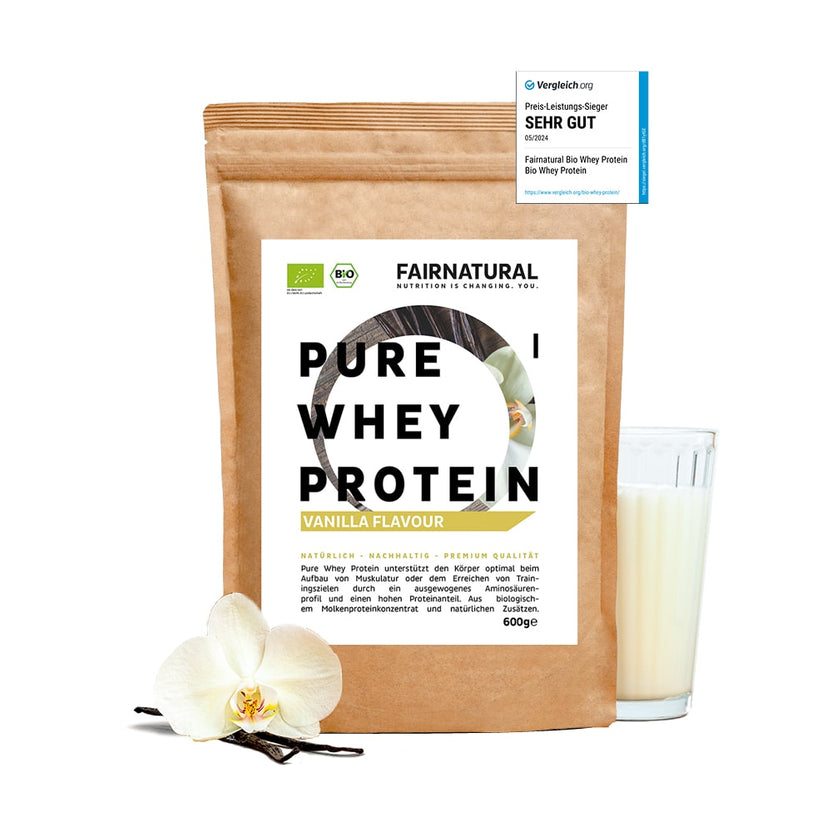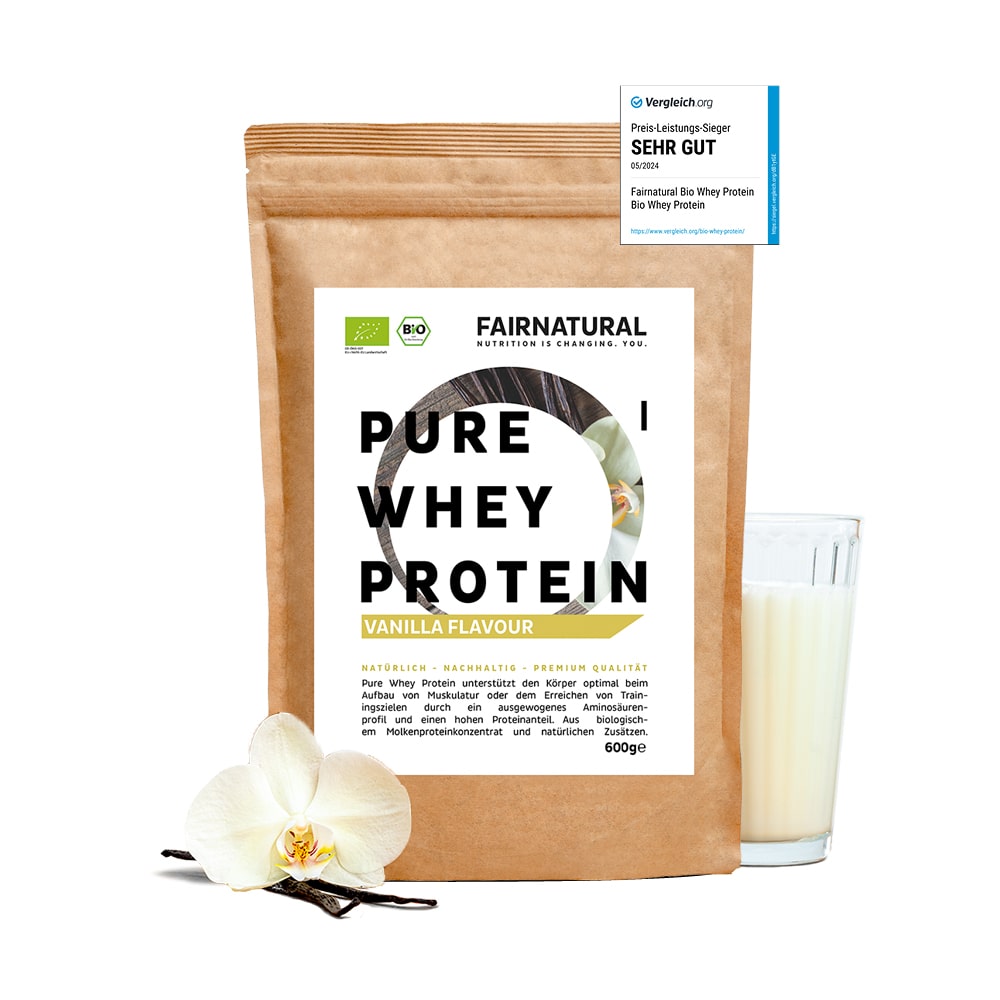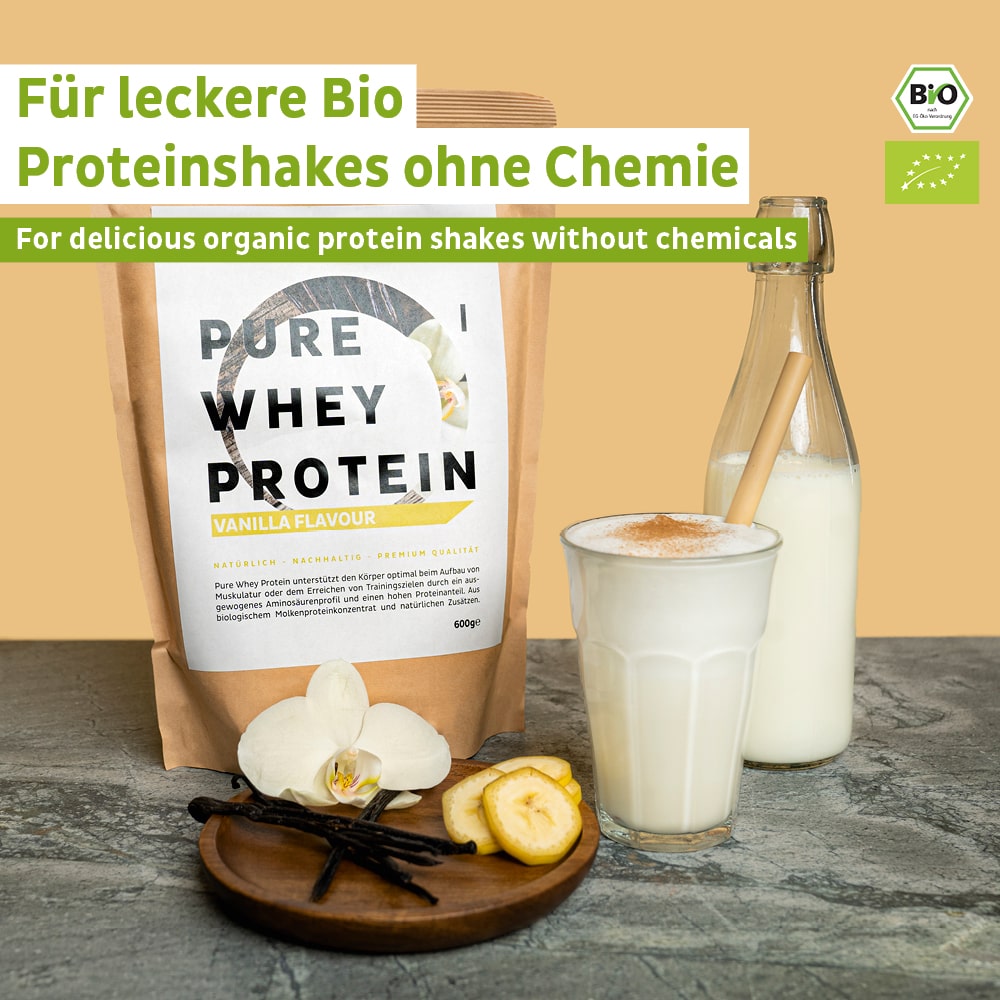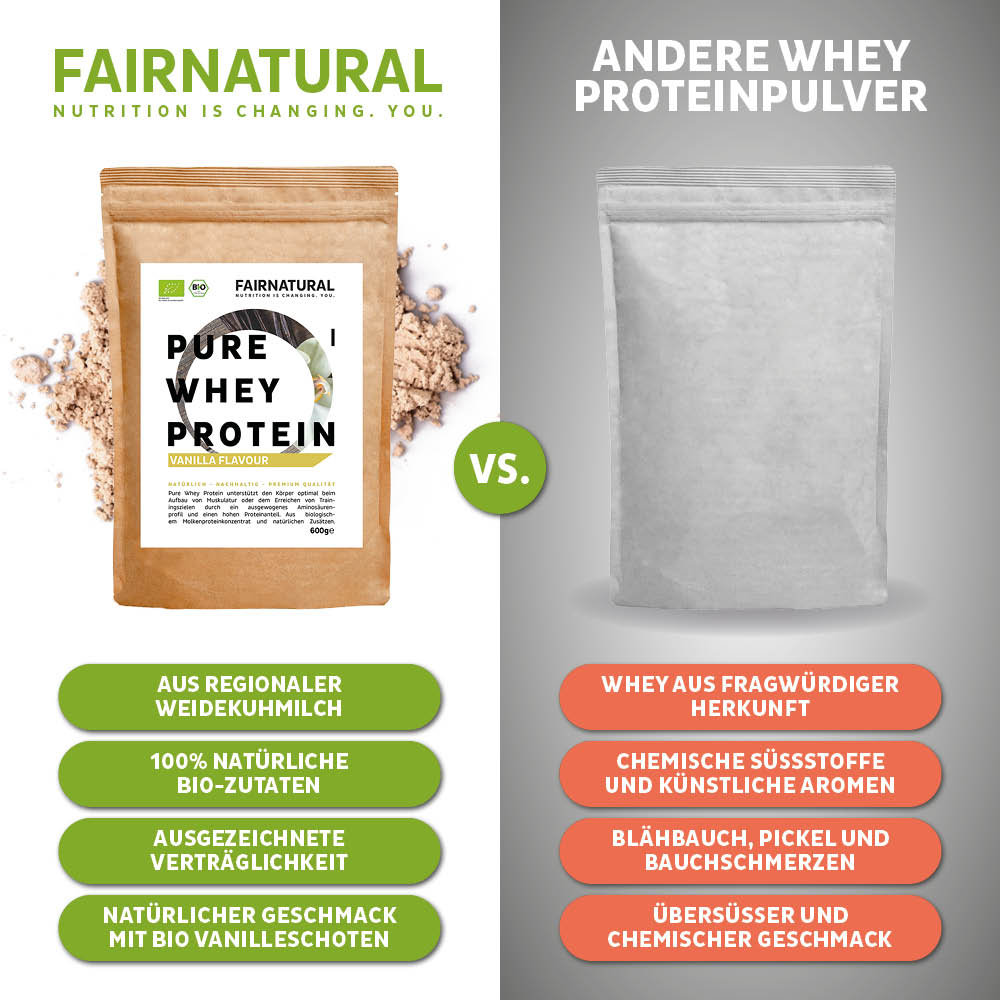
WHEY PROTEIN POWDER - Everything you need to know about it!
Content
- What does Whey Protein mean?
- Who is Bio Whey Protein suitable for?
- What is the daily protein requirement?
- When should I take Whey Protein?
- How can I take Whey Protein?
- What makes Fairnatural 's organic Whey Protein so unique?
What is this blogpost about?
Whey protein powder is whey protein that is extracted from whey by microfiltration or ultrafiltration. Due to its high protein content and fast bioavailability, Whey Protein is a popular protein source for many athletes to support muscle building or dieting.
Whey protein powder is equally one of the best known and most popular supplements the fitness market has to offer. As a result, whey protein is available in every conceivable variation. Consumers are faced with a huge choice of products and often do not know which one is the best. In this article, you will learn general information about Whey Protein, as well as tips and recommendations for the correct intake of your organic Whey.

What does Whey Protein mean?
Whey protein" means nothing other than whey protein. This means that the protein is obtained from whey. Organic Whey Protein contains all the essential amino acids. The body cannot produce these itself from other amino acids. Whey protein therefore has a very high biological value. The biological value indicates how well the food protein can be utilised in the body.
Who is Bio Whey Protein suitable for?
Bio Whey Protein is suitable for anyone who wants to either build muscle or maintain existing muscle. The protein powder provides the body with the necessary building blocks for muscle growth. In addition, a high blood protein level through a protein-rich diet prevents the body's own muscle protein from being attacked and muscle from being broken down accordingly. This can be the case during diets, but also during prolonged athletic exertion. Whey protein is highly valued by both strength and endurance athletes.
This supplement is largely harmless. Only people with pre-existing conditions should not consume too much protein. Whey protein can also be cleverly incorporated into a fat-reducing diet to facilitate muscle building and fat loss.
What is the daily protein requirement?
A normal person who does no sports needs about 0.8 g of protein per kilogram of body weight per day. Expressed in figures, this means that a 70-kilogram adult without sporting activity has a protein requirement of 56 g per day. However, an active sportsman/athlete has an increased protein requirement, which has been shown in various studies.
With a sports workload of 1-3 hours per week, there is a protein requirement of 0.9-1.1 g per kilogram of body weight. Even a slight increase in sporting activities results in a noticeable increase in the protein requirement. The protein requirement increases to 1.2-1.4 g protein per kilogram of body weight for competitive athletes in endurance sports (jogging, cycling, swimming).
This happens, among other things, through the increased use of amino acids (mainly branched-chain amino acids) for energy production during long endurance exercise. During endurance sports over several hours, up to 10 % of the required energy can be provided by amino acids. In order to counteract a load-induced reduction in muscle mass, it is also necessary for endurance athletes to provide the body with a sufficient amount of protein. The branched-chain amino acids valine, leucine and isoleucine are particularly important in this case.

In strength sports, the protein requirement looks different again. A competitive athlete in the strength sector (bodybuilder, crossfit athlete, boxer, climber) needs as much as 1.7-1.8 g of protein per kilogram of body weight. For athletes in the power sports sector, the protein requirement is greatly increased by the use of amino acids for regeneration and the formation of muscle tissue. Covering the existing protein requirement is the necessary prerequisite for building up the body's own muscles.
When should I take Whey Protein?

One of the advantages of Whey is its rapid availability in the body. The high proportion of BCCAs means that the branched-chain amino acids can be used to build new muscle tissue immediately after ingestion. Consequently, the optimal time to take it is directly after a training session.
As protein requirements remain elevated for up to 36 hours after a workout, you should not only provide your body with protein directly after training. In the sachet of your Pure Whey protein you will find a measuring spoon for portioning. To make a shake, use three level scoops (30 g) of your protein powder and dissolve in 250 ml of water or low-fat milk. You can have up to 3 protein shakes a day to boost your training progress.
When the human body metabolises protein, ammonia is produced, which is converted to urea. This is excreted through the urine. Accordingly, it is recommended to support a high protein intake with an increased intake of fluids.
However, you should not consume the protein shakes with your Whey protein directly one after the other. Give your body a few hours between shakes, as you normally do with meals. This way you give your body the chance to really use the Whey protein.
How can I take Whey Protein?
For the "how" of taking Whey protein, you can let your imagination run wild. The "classic" way to take protein powder is to simply dissolve the powder in water or low-fat milk. This gives you a great tasting cold drink. However, if you like to try new things, you can mix your Whey into muesli or combine it with yoghurt. Find more delicious recipe ideas for your Whey protein here!
What makes Fairnatural's organic Whey Protein so unique?
✔ Milk from grazing cows
✔ Production in Germany with the highest hygiene standards
✔ High BCAA content
✔ Increased protein content
✔ Without artificial colours
✔ Without chemical additives
✔ Perfect solubility
✔ Sustainable shipping
✔ Realisation of tree planting

You are convinced of our organic Whey protein powder? Then order it now here:






Organic Whey Protein Powder Vanilla
"Delicious organic whey protein from regional pasture-raised cow's milk."

✔ Regional & sustainable production at Heidelberg and compostable packaging
✔ One bag contains 600g of the finest protein powder with real organic vanilla without any chemicals
✔ Without harmful sweeteners but with natural organic date powder
Commitment to clean sport: Our Pure Whey Protein is regularly tested for selected doping substances.
